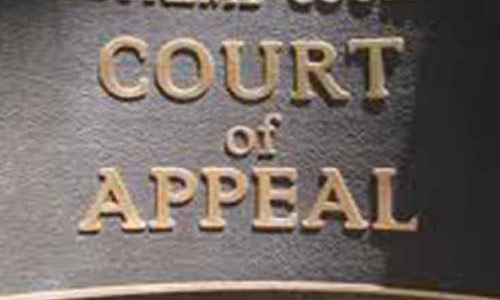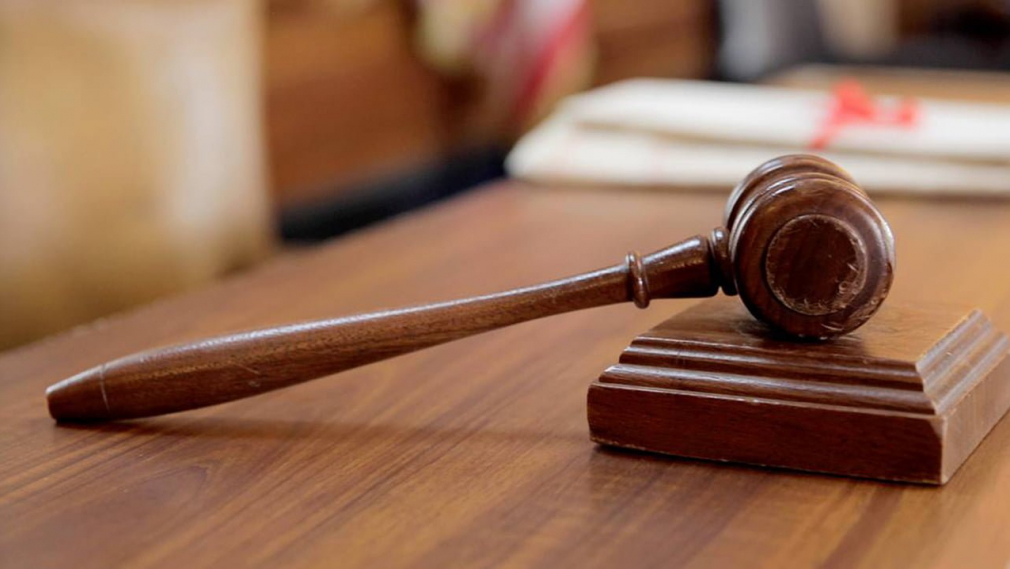COURTROOM NEWS 04/03/2022
Court Of Appeal Affirms 7 Years Jail Term For A Real Estate Company Staff Over N6 Billion Fraud

The Court of Appeal sitting at Abuja has upheld the conviction and 7 years jail term imposed on a Director of Katah Property and Investment Limited, Musa Ibrahim Datti.
The Federal High Court in Abuja, per Ijeoma L. Ojukwu, had on 21st June, 2021 found the Appellant guilty, convicted and sentenced for the offences of conspiracy and laundering of about N6 Billion upon a charge filed by the Economic and Financial Crimes Commission
Background
The Appellant was a signatory to the bank account of Katah Property and Investment Limited. EFCC alleged that monies were transferred into the account of the company by its Director, Alhaji Liman Isa Kantigi, who was at the same time holding various positions at the Niger State Government between 2011 and 2015. Thus, by reason of the money in the bank which he was signatory to, the Appellant was charged to court by the EFCC for conspiracy and been in possession of illegally acquired money contrary to section 15(2)(d) of the Money Laundering (Prohibition) Act, 2015.
At the close of the Prosecution’s case the Appellant filed a no case submission but same failed. The Appellant thereafter did not enter defence, he rather chose to rest his case on the case of the Prosecution.
At the conclusion of the trial, the court convicted the Appellant and sentenced him to seven years imprisonment. Dissatisfied with the conviction and sentence, he appealed to the Court of Appeal.
Arguments of Counsel before the Court of Appeal
Mr. Kehinde Ogunwumju, SAN on behalf of the Appellant argued that there was no evidence before the trial court of transfer of funds from Kantigi to the account of the Katah Property and Investment Limited neither was there evidence that the Appellant converted funds belonging to Kantigi or Niger State Government at the time Kantigi was holding various positions with the Niger Government or any other time.
The learned silk further argued that the Appellant was never in possession or control of the funds in the Katah Property and Investment Limited’s account and had no say in running of the company. Consequently, he vehemently argued that the ingredients of money Laundering were not proved against the appellant
The Appellant also argued that the burden of proof was wrongly placed on the Appellant. According to him, the burden of proof was supposed to be on the prosecution. He added that court wrongly relied on the case of Daudu v FRN because in that case, the charge against the Appellant was on the repealed 2004 Money Laundering Act which placed burden of proof on defendants, not the 2011 Money Laundering Act which has shifted burden of proof on the prosecution. As such, the right to fair hearing of the Appellant was breached.
Mr. J. S. Okutepa, SAN, in response argued on behalf of the EFCC that the money Laundering charged had been proved beyond reasonable doubt because the evidence of the Prosecution disclosed ingredients of the offence and the said evidence were not contradicted or challenged. According to him, the argument that the Appellant’s defence was not considered is irrelevant because the Appellant chose not to call evidence, rather, he rested his case on that of the Prosecution.
Resolution of the Appeal
The Court of Appeal noted from the outset that it was bound in duty to answer the following three questions before making its decision on whether or not the appeal has merit:
- Did the prosecution prove the essential elements of the offence;
- Was the case proved beyond reasonable doubt; and
- Was the evaluation of the evidence of prosecution and defence witnesses properly done.
According to the court, If the three questions are answered in the affirmative, the appeal ought to be dismissed. On the other hand, the appeal would have merit if any of the three elements is missing from the proceedings at the trial court.
The Court held that from the available evidence before the court, the Appellant was in possession of proceeds of unlawful activity. On this point, it relied on the decision of the trial court per justice Ojukwu thus:
“Each of the Defendants, by the evidence led by the prosecution said fund is or forms part of the proceeds of the unlawful act of Alhaji Liman Isah Kantigi, a.k.a Mohammed Abdullahi Musa, since there was no evidence that they generated such funds legitimately from their legitimate businesses and also being that it originates from Isah Kantigi without lawful progeny and at the time he held public office in Niger State. Niger State Government had petitioned EFCC on some stolen public funds, traced to Isah Kantigi who is on the run.”
The Court faulted the Defendant for not entering defence. According to the Court of Appeal, the EFCC led evidence to show that the Appellant was a signatory to the accounts in Guaranty Trust Bank Account No.0128615097 where the sum of over Two Billion Naira was deposited between 2011 and 2015 when one Alhaji Isah Liman Kantigi who is a Director of the Katah Property and Investment Limited held various positions in Niger State Government. Therefore, the Appellant was in a position to explain how come such sums of money was deposited in cash into the bank accounts.
“Yet, the Appellant herein failed to enter defence or contradict the evidence of the Respondent despite the fact that the no case submission was overruled. So, there is nothing before this court from the Record of Appeal to urge this court to set aside the judgment of the trial court. The law is settled that in a criminal trial. a Prima facie case is a case in which the evidence adduced by the prosecution, is sufficient to call upon the accused to make a defence, without which a court of law is competent to proceed to conviction.In other words, it means the prosecution has presented sufficient evidence to establish the ingredients of the offence that the accused is convictable, in the absence of contrary evidence.See Onagoruwa Vs. The State (1993)7 NWLR (Pt. 3030)49 at 81; Obinna Okeke Vs. The State (2012) LPELR-9793 (CA) at P.
“And so, the Appellant having elected not to call evidence at the trial court,but chose to rest her case on that of the prosecution,cannot use the avenue of this appeal to adduce evidence.The point here is that, by the Appellant choosing to rest his case on the prosecution,he had denied the trial court the opportunity of assessing the credibility of the accused as a witness as compared to the prosecution for purpose of evaluation and determining which said to believe.Thus,the Appellant had shut himself out and should therefore not be heard to complain.” The Court added
On conspiracy, the Court explained that the presence of Alhaji Isah Liman Kantigi is not fundamental to the establishment of the charge of Money Laundering because according her, it is not the law that a person who is the originator of the predicate offence or offences and who is at large must first be charged, tried and convicted before his alleged co-conspirator like the Appellant can be charged and convicted of the offences charged. It added that the case of Dr. Raymond Dokpesi Vs. FRN in CA/ABJ/CR/1073/2020 delivered on 1 April 2021 failed to accord with the decisions of the Supreme Court and the decisions of the Court of Appeal. It relied on Yusuf Vs. Federal Republic of Nigeria (2017) LPELR-43830 (SC) at 28-29 Paras.E-F.
It also held, “And just as the 1st Respondent had submitted, I am of the firm opinion that it is not the law that an accused person or a defendant cannot be tried and convicted if and when his co-conspirator is at large or has become fugitive from law. Both this court and the Supreme Court has settled this issue beyond any debate. It is an established law that it is not necessary in a conviction for conspiracy, that the conspirators should come together for the purpose or that there should have been previous consultation. In R. Vs. Murphy (1837)8 C. & P. at 310, 173 E. R. at 508, Coleridge J. directing the jury stated: Although the common design is the root of the charge, it is not necessary to prove that these two parties came together and actually agreed to have this common design and pursue it by common means, and so to carry it into execution…If you find that these two persons pursued by their acts, the same object often by the same means, one performing one part of an act and the other another part of the same act, so as to complete it, with a view to the attainment of the object which they are pursuing, you will be at liberty to draw the conclusion that they have been engaged in a conspiracy to effect that object.”
Four Appeals against the same judgment were dismissed by Court of Appeal, thereby upheld the decision of the trial court in its entirety. In the Suits APPEAL NO: CA/A/CR/412/2021 between Musa Ibrahim Datti And Federal Government of Nigeria, Sadiq Air Travel Agency LTD and Katah Property and Investment Limited; APPEAL NO: CA/A/CR/468/2021 between Alhaji Liman Isah Kantigi and Federal Government of Nigeria, Musa Ibrahim Datti, Sadiq Air Travel Agency LTD and Katah Property and Investment Limited; APPEAL NO: CA/A/CR/413/2021, between Sadiq Air Travel Agency LTD, and Federal Government of Nigeria, Musa Ibrahim Datti, and Katah Property and Investment Limited; APPEAL NO: CA/A/CR/411/2021, Katah Property and Investment Limited, and Federal Government of Nigeria.
“The substantive Appeal too fails and is hereby dismissed for lack of merit.
“The judgment of the Federal High Court,Abuja delivered by Hon. Justice Ijeoma L. Ojukwu on 21st June, 2021 in Suit No:FHC/ABJ/CR/100/2018 is hereby affirmed.No order as to cost.”, The Court of Appeal held



